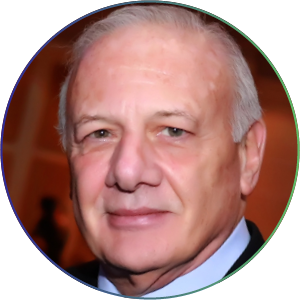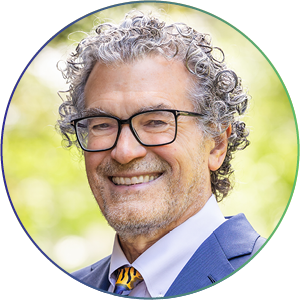
Holly J. Humphrey, MD, MACP (bestowed posthumously)
Josiah Macy Jr. Foundation
Throughout her long and distinguished career, Holly J. Humphrey, MD, MACP, was a tireless advocate for advancing excellence in medical education and for supporting learners throughout their education. From 1989, when she joined the faculty of medicine, until 2018 when she stepped down as the Ralph W. Gerard Professor in Medicine and dean of medical education at the University of Chicago Pritzker School of Medicine (Pritzker), Dr. Humphrey played a central role in transforming the clinical learning environment, including developing one of the nation’s first white coat ceremonies, which took place at Pritzker in 1989.
Vineet Arora, MD, MAPP, the current dean of medical education at Pritzker, lauded Dr. Humphrey for her innovative approach, noting that the university served as “the laboratory where she honed and developed her ideas for exemplary clinical learning environments, professional identity formation in emerging physicians, and the importance of mentoring as a means of transmitting the values of the profession.” Dr. Humphrey’s students agreed, as she was honored more than 25 times with the Favorite Faculty teaching award, her most prized recognition.
After 15 years at the University of Chicago, Dr. Humphrey was tapped to become the eighth president of the Josiah Macy Jr. Foundation, a private, philanthropic, grantmaking organization and the only national foundation dedicated solely to improving the education of health professionals. Over the next seven years at its helm, Dr. Humphrey created a lasting, nationwide influence on health professions education. She convened four national consensus conferences that addressed: bias and discrimination in the clinical environment, lessons from the COVID-19 pandemic, fairness in medical education evaluation, and artificial intelligence in medical education. The resulting recommendations and scholarly works were published in special issues of Academic Medicine.
Additionally, Dr. Humphrey renewed a signature initiative of the foundation, the Macy Faculty Scholars program, on its 10th anniversary in 2020, so it could continue to help develop the next generation of leaders in medicine and nursing. She also implemented a series of program modifications, expanding the impact and accessibility of this prestigious career development award.
Dr. Humphrey championed the Macy Foundation’s steadfast commitment to excellence by engaging broad and diverse perspectives, fostering teamwork among future health professionals, and equipping them to address ethical challenges. In her obituary on the foundation’s website, her colleagues wrote, “In all of her professional roles and in every stage of her distinguished and impressive career, Dr. Humphrey was guided by her abiding principles, which included centering the vulnerable — both patients and learners — and working on their behalf as a bedrock for decision-making.” This was further demonstrated by her active engagement as a member of several AAMC affinity groups and as an elected member of the National Academy of Medicine. Additionally, she served as a board member of several organizations, including Alpha Omega Alpha, the National Resident Matching Program, and the American Board of Internal Medicine, among others.
Dr. Humphrey graduated from North Central College in Naperville, Illinois, and earned her MD with honors from the University of Chicago. Here, she also completed an internal medicine residency, chief residency, and pulmonary and critical care fellowship.

Thomas J. Nasca, MD, MACP
Accreditation Council for Graduate Medical Education
After 17 years at the Accreditation Council for Graduate Medical Education (ACGME), Thomas J. Nasca, MD, MACP, stepped down from his position as president and CEO on Jan. 1, 2025. Dr. Nasca’s distinguished career has included a long partnership with the AAMC: During his tenure as dean of Sidney Kimmel Medical College at Thomas Jefferson University (SKMC), he served on the AAMC Council of Deans from 2000 to 2007 and presented at numerous conferences and meetings.
During his time leading the ACGME, graduate medical education (GME) grew significantly: ACGME-accredited residencies rose from 3,633 programs in 2008 to 5,270 programs today. Accredited fellowships also increased in that same period, from 4,112 programs to 7,292 programs. In 2009, Dr. Nasca responded to a request from Singapore’s Ministry of Health to extend the ACGME accreditation model beyond U.S. borders; as of mid-2025, ACGME International accredits institutions and programs in 13 countries, with plans to increase this number. To manage this rapid, worldwide growth, Dr. Nasca implemented the Next Accreditation System, a data-driven process for accrediting programs and institutions, while identifying and supporting opportunities for their continuous improvement.
He also enhanced the ACGME’s commitment to the development of the future physician workforce by creating its department of education and establishing the Journal of Graduate Medical Education to publish scholarly work by residents, fellows, and faculty. Furthermore, Dr. Nasca created a research division that focuses on milestones development, GME outcomes, and physician well-being.
The ACGME Clinical Learning Environment Review (CLER) Program for assessing clinical learning environments and improving education in patient safety and quality was yet another of Dr. Nasca’s initiatives. His vision of having consistent, uniform national accreditation standards and desired outcomes for GME also led to the creation of a single system for DO-granting schools when accrediting U.S. residencies and fellowships; as a result, different medical education traditions help to develop the next generation of physicians.
Dr. Nasca has worked to support clinician well-being and substance use disorder education and treatment as co-chair and participant in the National Academy of Medicine’s Action Collaborative on Clinician Well-Being and Resilience. Also a strong advocate for the social contract in medicine, Dr. Nasca established the ACGME Center for Professionalism and the Future of Medicine. This center helps equip physicians with the moral framework, ethical decision-making skills, courage, and perseverance to evolve clinical care and learning environments through a patient-first lens. Dr. Nasca serves as the center’s initial senior fellow and administrative director.
He has published and lectured widely, educating medical students, residents, and fellows. He continues to serve as professor of medicine at SKMC and as senior scholar in the department of medical education at the University of Illinois College of Medicine in Chicago.
Dr. Nasca earned a BS from the University of Notre Dame and an MD from Jefferson Medical College in 1975 (now SKMC), and completed his residency and served as chief medical resident in internal medicine at the Mercy Hospital of Pittsburgh. He completed a nephrology fellowship at Brown University and Rhode Island Hospital in 1981.

Eliseo J. Pérez-Stable, MD
National Institute on Minority Health and Health Disparities
From September 2015 through March 2025, Eliseo J. Pérez-Stable, MD, led the National Institute on Minority Health and Health Disparities (NIMHD; part of the National Institutes of Health) as its director. In this role, he leveraged his personal history and passion for public health to define a national agenda focused on minority health and health disparities and oversaw the institute’s $535 million budget in 2024.
His efforts have helped to advance patient-centered care and improve cross-cultural communication skills among clinicians and scientists, fostering the development of a biomedical and health care workforce prepared to address and prevent health challenges in underserved communities. Early in his tenure, he formally designated sexual minority groups as health disparity populations for NIH research.
Born in Cuba, Dr. Pérez-Stable’s parents sent him to live with family in Miami in 1960 to avoid communist indoctrination, before reuniting with their son in 1961. He earned a BA in chemistry from the University of Miami and an MD from the University of Miami School of Medicine in 1978 (now the University of Miami Leonard M. Miller School of Medicine). He completed a primary care internal medicine residency and research fellowship at the University of California, San Francisco (UCSF).
Dr. Pérez-Stable began his work researching and supporting the health of underserved groups as a professor of medicine at UCSF in the 1980s. He also served as chief of the university’s Division of General Internal Medicine and director of the Center for Aging in Diverse Communities. During his work with the center, Dr. Pérez-Stable continued his commitment to developing a diverse workforce in clinical and population science through mentorship and collaboration with a range of minority fellows and junior faculty from across the spectrum of health care professions.
Widely recognized as a leader in Latino health care and disparities research, Dr. Pérez-Stable devoted 30 years of research to supporting smoking cessation and improving tobacco control policies in Latino populations in the United States and Latin America. His collaborations with public health advocates and researchers in Argentina improved that country’s awareness of tobacco use as a critical public health problem and supported efforts to expand campaigns for smoking cessation and prevention.
Dr. Pérez-Stable also made impactful and lasting contributions to help mitigate the risk of cancer among medically underserved populations through several research initiatives. He served as an NCI-funded staff investigator and assistant director for Health Care Disparities at the UCSF Helen Diller Family Comprehensive Cancer Center, additionally serving as a member of the NCI and American Legacy Foundation’s Tobacco Research Network on Disparities.
A long-time partner to the AAMC, Dr. Pérez-Stable has served as a speaker for faculty development programs and as a partner on joint programs. His collaborations have improved access to resources for physicians dedicated to improving health outcomes in underserved communities.